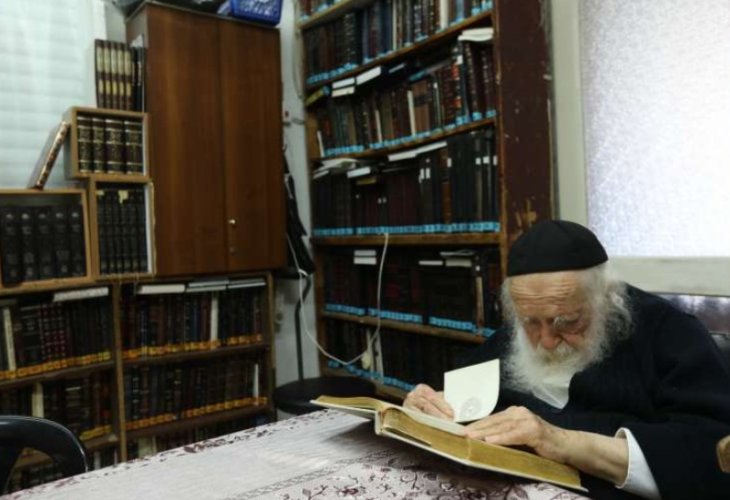Facts in Judaism
Daf Yomi: A Lifelong Journey of Torah Study
Rabbi Chaim Kanievsky’s Practical Insights and Guidance for Every Learner
 Rabbi Chaim Kanievsky immersed in his studies (Photo: Flash 90)
Rabbi Chaim Kanievsky immersed in his studies (Photo: Flash 90)In the special booklet Shesamt Chelkenu, published in honor of the Siyum HaShas, a collection of questions and answers from the late Rabbi Chaim Kanievsky offers invaluable guidance for those engaged in Daf Yomi, the daily study of the Talmud. With his characteristic brevity and clarity, Rabbi Kanievsky addressed a wide range of practical concerns, offering insight rooted in halachic tradition and spiritual sensitivity.
When asked whether Daf Yomi is appropriate for every Jew, Rabbi Kanievsky answered, “For those who cannot learn more,” highlighting that Daf Yomi is an excellent framework for those unable to dedicate additional time to learning.
For those who have completed the entire Shas through Daf Yomi, the next step is to elevate their learning: “A page with Tosafot (classical early Talmudic commentary),” he advised, recommending deeper engagement with the commentaries. Regarding classes that don’t meet on Shabbat, Rabbi Kanievsky suggested that participants should “make an effort on Shabbat as well,” but when that's not possible, then “on Friday, two pages.”
To those who had started learning in the previous cycle but stopped when they reached Tractate Eruvin—often considered one of the more complex tractates—his reply was firm: “Eruvin is not a difficult Gemara.” And even if it is challenging for some, “Chumash is also difficult.” His advice was simple and profound: “Pray.” Quoting Tractate Niddah 70, Rabbi Kanievsky reminded learners that wisdom ultimately comes from Heaven. To help others persevere, he advised teachers to “explain the Gemara to them.”
As for the ideal time to study, “In the morning,” was his clear preference, citing the Mishnah Berurah 155:2. When it comes to kollel students, Rabbi Kanievsky noted, “It is not customary” for them to take on Daf Yomi in addition to their rigorous study schedule. However, for yeshiva students, “It won’t hurt.” If someone is already studying a different tractate, Rabbi Kanievsky encouraged them to “study both.”
Those who have already completed Shas multiple times face a choice: begin studying the Talmud Yerushalmi (Jerusalem Talmud) or continue reviewing the Talmud Bavli (Babylonian Talmud). The Rabbi’s answer: “Both, Bavli and Yerushalmi.” And if one cannot manage both? “They will succeed, they will succeed...”
As for combining Daf Yomi study with other halachic works such as the Rambam, Tur, or Shulchan Aruch, Rabbi Kanievsky said it is “not necessary.” When teaching, he emphasized that one should use the commentary of “Rashi.” Beginning classes with a short lesson in mussar (ethical teachings) was deemed unnecessary—“Start learning,” he advised.
When asked whether a longtime attendee should start a class of their own, the response was direct: “Not necessary.” Regarding the preferred mode of study—listening to a class or learning with a partner—he simply said, “Both.”
As for evening kollels, Rabbi Kanievsky recommended maintaining their original format rather than converting them into Daf Yomi kollels.
He confirmed that one fulfills the mitzvah of Torah study even when learning through listening alone, and that this form of study is valid for completing a tractate. Still, if a page is missed, Rabbi Kanievsky insisted it should be made up “immediately,” rather than skipped and saved for later.
Addressing a well-known statement by the late Rabbi Aharon Leib Shteinman—that those who begin Daf Yomi have a segulah (spiritual merit) to live to complete the Shas—Rabbi Kanievsky supported it through “logical reasoning,” referencing the Yerushalmi in Nazir.
When one completes a tractate, he should recite “Hadran Alach” (celebratory formulation recited upon finishing a tractate) personally, not relying solely on the teacher’s recitation. The teacher, he advised, should follow the standard wording of the text, even if addressing a group.
When reaching Seder Kodashim, where tractates are short, Rabbi Kanievsky maintained that a celebration is appropriate after “each tractate.”
Finally, when asked for a blessing for the tens of thousands of Daf Yomi learners around the world, Rabbi Kanievsky responded simply but powerfully: “The Yerushalmi too… blessing and success.” And his personal blessing to all: “That they be given the opportunity to learn.”
This collection of responses from Rabbi Chaim Kanievsky offers not only halachic clarity but also spiritual encouragement. For anyone walking the path of daily Talmud study, his guidance remains a steady light, helping learners remain consistent, deepen their learning, and grow in faith.

